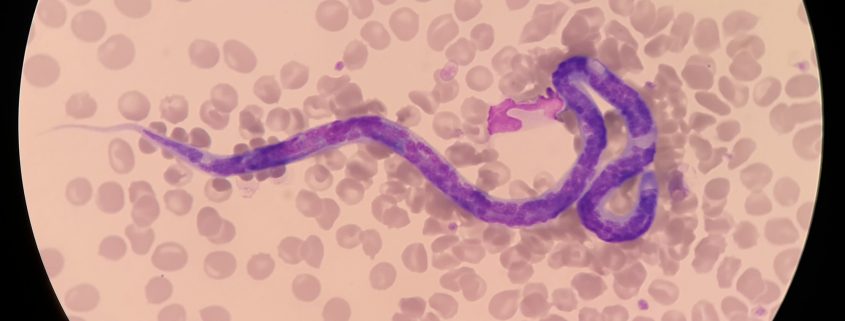As a pet parent, caring for your furry friend begins with preventative health. One of the most important aspects of prevention for dogs and cats is yearly heartworm testing and year-round heartworm prevention medication.
Heartworm disease is one of the most dangerous and life-threatening diseases your pet can face. This is why prevention is necessary to keep your pet safe. Keep reading to learn what causes heartworms, the symptoms, treatment, and, most importantly, how to prevent your pet from becoming infected.
Heartworm Transmission
Heartworms are spread by mosquitoes that carry infective heartworm larvae, which are tiny, immature heartworms. Not all mosquitoes carry heartworm larvae—only those insects that have previously fed on an animal with heartworm disease can be carriers. After an infected mosquito bites your pet, the larvae enter their system. These larvae quickly move through the bloodstream and onto the heart, lungs, and arteries. Infection won’t occur in your pet immediately upon being bitten by a mosquito with heartworm. When the larvae develop into adult heartworms and begin reproducing, your pet will actively test positive.
Symptoms of a Heartworm Infection
Early on, your pet may show no signs of having heartworms. But as the worms grow and multiply, symptoms will become evident, increasing in severity as the disease progresses.
There are four classes of infection:
- Class one has no symptoms or just a mild cough.
- Class two is marked by mild exercise intolerance and persistent cough.
- Class three will result in abnormal lung sounds, weak pulse, fainting caused by impaired blood flow to the brain, decreased appetite, weight loss, and swelling.
- Class four is known as caval syndrome–a life-threatening cardiovascular collapse–which is marked by labored breathing, pale gums, and dark coffee-colored urine, leading to complete organ failure.
How do Veterinarians Test for Heartworms?
Veterinarians use a blood test to check a dog or cat for heartworms. This blood test detects specific heartworm proteins, called antigens, released by adult female heartworms into your pet’s bloodstream. In most cases, the earliest the heartworm proteins can be detected in the bloodstream is about five to six months after being bitten by an infected mosquito.
What Happens After a Positive Test Result?
No one wants to hear that their dog has heartworm, but the good news is that most infected dogs can be successfully treated. Here’s what you should expect if your dog tests positive:
- Confirm the diagnosis: Once a dog tests positive on an antigen test, the diagnosis should be confirmed with additional testing. Because the treatment regimen for heartworm is expensive and complex, your veterinarian will want to be positive that treatment is necessary.
- Restrict exercise: This requirement might be hard to adhere to, especially if your dog is accustomed to being active. But your dog’s normal physical activities must be restricted as soon as the diagnosis is confirmed because physical exertion increases the rate at which the heartworms cause heart and lung damage. The more severe the symptoms, the less active your dog should be.
- Administer treatment: Once your veterinarian has determined your dog is ready for heartworm treatment, they will recommend a protocol involving several steps. Dogs with class one or class two heartworm disease have a high success rate with treatment. Dogs with class three and above can also be successfully treated, but the possibility of complications is greater.
- Test (and prevent) for success: Approximately nine months after treatment is completed, your veterinarian will perform another antigen test to confirm that all heartworms have been eliminated. Then, to avoid the possibility of your dog contracting heartworm disease again, you will want to administer heartworm prevention year-round for the rest of your pup’s life.
Unlike heartworm disease in dogs, no approved treatment exists for heartworm infection in cats. Because of the additional complications associated with diagnosing and attempting to treat cats, prevention becomes the best weapon against heartworms.
Protecting your Pet Against Heartworm
The phrase, “An ounce of prevention is worth a pound of cure” couldn’t be truer when protecting your pet against heartworms. Giving a year-round preventative is the easiest and least expensive way to go. You can give your pet a monthly pill or apply a topical to their skin to prevent heartworms. The FDA requires a prescription for heartworm medication, and veterinarians usually require a negative heartworm test to get a prescription. Once you get your pet’s prescription, look online for manufacturer coupons or rebates. Certain companies may offer special discounts if you purchase 6 or 12 months of preventative medication at a time. Remember, the cost of a monthly preventative is mere pennies compared to the cost of treating an active heartworm infection, which can be tens of thousands of dollars.
Your Pets are our Priority!
At the National Animal Supplement Council, our top priority is to promote the health and well-being of your pets. That’s why we created the NASC Audit Program and the Quality Seal: to help you identify animal health and nutritional supplements from responsible suppliers committed to producing the highest quality, most consistent products on the market. Visit our website to learn more and see a list of companies and brands awarded the NASC Quality Seal.


